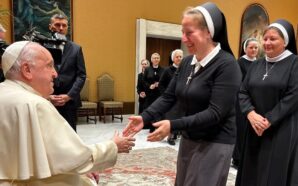April 12 is Easter Sunday of the Resurrection
Over the centuries, Easter has changed its appearance to accommodate different societies. In the early centuries, its celebration was workaday. The weekly Eucharist was a celebration, sometimes in homes, to prepare for Easter. In places free from persecution, it might be celebrated in dedicated settings. When the persecutions stopped, Easter took on a more ritual appearance – large churches in the cities, a month of fasting to prepare for Easter and a week to celebrate the events leading up to Jesus’ death and Resurrection.
In Europe, the rising of Christ from death was matched to the green and flowering of spring after the grey winter of Lent. In churches, it was a time of colour after the purple of Lent, a time for celebration and feasting after a time of penance. In a Christian society, the events, games, vegetation and meals at Easter were marked by Christ’s story. Hot cross buns, Easter eggs, brodetto pasquale, passion plays, Easter lilies and passion fruit owe their names to Easter.
As society has become secular, many relics of its religious tradition remain: the Easter holiday in which extended families gather to eat together, Easter eggs and bunnies, the special foods of different migrant communities, secular events have also grown in popularity to mark the season – football matches that marked the transition from the cricket season to football and country tennis tournaments. The dominance of secular and corporate rituals has more recently been symbolised in the introduction of professional football games held on Good Friday.
In Christian terms, the public celebration of Easter this year will look more like Lent or like Passion week. We are captive to Coronavirus. There will be no religious celebrations, no concerts, no barbeques, no football matches, no gatherings of our extended families. The atmosphere, too, will be one of constraint rather than freedom, of fear rather than confidence. Travel will be limited, schools likely to be closed, the fear of infection and isolation will hang over us, many people will have lost work and income and the future will remain uncertain.
These restrictions are hurtful. In their temporary loss, they will remind us of the simple gifts that so many of our fellow Australians receive in their secular celebrations. They will also confront us with the original depths of the Easter story. It is the story of a man who preached justice for the downtrodden and freedom for prisoners being himself made a prisoner and killed, only to rise from death. It is the story of a God who was fully invested in our human life in its cruelty and tragedy, and who offers freedom.
They remind us of our tradition which emphasises compassion for the poor and vulnerable and hope in the most apparently hopeless human beings. They remind us that love is stronger than death.
Fr Andrew Hamilton SJ writes for Jesuit Communications and Jesuit Social Services.








